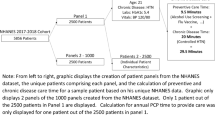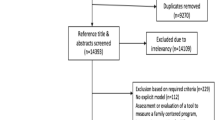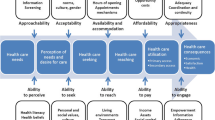Abstract
OBJECTIVE: Looking to the experience in the United States with managed care and the possible introduction of gatekeeping in the near future in Germany, we performed a population-based survey to examine preferences for future gatekeeping arrangements.
DESIGN: Cross-sectional telephone survey.
SETTING: Four health districts in Thuringia (formerly East Germany) and Lower Saxony (formerly West Germany).
PARTICIPANTS: Out of a random sample of 644 adults in the 4 districts, 415 persons (64.4%) took part in the survey.
MEASUREMENTS AND MAIN RESULTS: Using multiple logistic regression, we analyzed associations between preferences for gatekeeping arrangements and patient satisfaction, insurance status, and sociodemographic characteristics. Seventy-four percent of respondents valued first-contact care, especially older people (odds ratio [OR], 4.3; 95% confidence interval [95% CI], 2.0 to 9.3), people who were very satisfied with the relationship with their family physician (OR, 2.7; 95% CI, 1.6 to 4.8) and members of sickness funds in contrast to privately insured persons (OR, 2.4; 95% CI, 1.2 to 5.2). The family physician’s influence in coordinating the use of specialist services was appreciated by 86%, more often by members of sickness funds (OR, 5.9; 95% CI, 2.4 to 14.3), people who were very satisfied with their doctor’s professional competence (OR, 3.2; 95% CI, 1.6 to 6.3) and older persons (OR, 2.9; 95% CI, 1.1 to 7.7).
CONCLUSIONS: A vast majority of the German population would accept their family physician as entry point and as coordinator of all other health services. Since patient satisfaction, among other reasons, strongly influenced preferences for gatekeeper arrangements, family physicians themselves may be able to promote primary care health services.
Similar content being viewed by others
References
World Health Organization. Primary Health Care: Alma-Alta 1978. Geneva, Switzerland: WHO, 1978. Health for All; No. 1.
Coulter A. Why should health care services be primary care-led? J Health Serv Res Policy. 1996;1:122–4.
Starfield B. The future of primary care in a managed care era. Int J Health Serv. 1997;27:687–96.
Starfield B, Cassady C, Nanda J, Forrest CB, Berk R. Consumer experiences and provider perceptions of the quality of primary care: implications for managed care. J Fam Pract. 1998;46:216–26.
Schucht C, Kochen MM. Managed care: a model for outpatient care in Germany? [in German]. Z Ärztl Fortbild Qualitätssich. 1998;92:685–9.
Halm EA, Causino N, Blumenthal D. Is gatekeeping better than traditional care? A survey of physician’s attitudes. JAMA. 1997;278:1677–81.
American Medical Association (AMA). Principles of managed care. Available at www.ama-assn.org/advocacy/principl.htm. Accessed: January 1999.
Etter JF, Perneger TV. Health care expenditures after introduction of a gatekeeper and a global budget in a Swiss health insurance plan. J Epidemiol Community Health. 1998;52:370–6.
Jackson JL. The German health system. Lessons for reform in the United States. Arch Intern Med. 1997;157:155–60.
Glöser S. Toward managed care models [in German]. Dtsch Ärztebl. 1999;96:441.
Bodenheimer T, Lo B, Casalino L. Primary care physicians should be coordinators, not gatekeepers. JAMA. 1999;281:2045–9.
Volpp KG, Schwartz JS. Myths and realities surrounding health reform. JAMA. 1994;271:1370–2.
Wasern J, Güther B. The German health system: Attitudes and expectations of the population—a stock-taking [in German]. Neuss: Janssen-Cilag; 1998.
Tabenkin H, Gross R, Brammli S, Shvartzman P. Patient’s view of direct access to specialists: an Israeli experience. JAMA. 1998;279:1943–8.
SAS Institute Inc. SAS/STAT. User’s Guide. Version 6. 4th ed. Cary, NC: SAS Institute Inc.; 1989.
Salmon CT, Nichols JS. The next-birthday method of respondent selection. Publ Opinion Quart. 1983;47:277–92.
Federal Statistical Office (ed.) Statistical Yearbook 1997 for the Federal Republic of Germany [in German]. Stuttgart: Metzler-Poerschel; 1998.
Baker R. Development of a questionnaire to assess patient’s satisfaction with consultations in general practice. Br J Gen Pract. 1990;40:487–90.
Stokes ME, Davis CS, Koch GG. Categorial data analysis using the SAS system. Cary, NC: SAS Institute Inc.; 1995:163ff.
Starfield B. Is primary care essential? Lancet. 1994;344:1129–33.
Blendon RJ, Benson J, Donelan K, et al. Who has the best health care system? A second look. Health Aff. 1995;14:221–30.
EMNID. A survey of doctors and patients [in German]. Köln: Capital and Schwarz Pharma; 1997.
Costler D, Klaes L. Free access to doctors—a population based survey [in German]. Bonn: Wissenschaftliches Institut der Ärzte Deutschlands (WIAD) e.V.; 1999.
Schmittdiel J, Selby JV, Grumbach K. Quesenberry CP Jr. Choice of a personal physician and patient satisfaction in a health maintenance organization. JAMA. 1997;278:1596–9.
Tudor CG, Riley G, Ingber M. Satisfaction with care: do Medicare HMOs make a difference? Health Aff. 1998;17:165–76.
Ullrich CG. Solidarity and security. The acceptance of the statutory health insurance [in German]. Z Soziol. 1996;25:171–89.
Kulu-Glasgow I, Delnoij D, de Bakker D. Self-referral in a gatekeeping system: patient’s reasons for skipping the general-practitioner. Health Policy. 1998;45:221–38.
Bernard DB, Shulkin DJ. The media vs managed health care: are we seeing a full court press? Arch Intern Med. 1998;158:2109–11.
Himmel W, Ittner E, Kron M, Kochen MM. Comparing women’s view on family and sexual problems in family and gynecological practices. J Psychosom Obstet Gynecol. 1999;20:127–35.
Frazier JB. Current trends in American managed care: economic, technological, and political factors. Gesundheitsökon Qualitätsmanage 1999;4:48–54.
Himmel W, Kron M, Hepe S, Kochen MM. Drug prescribing in hospital as experienced by general practitioners. East versus West Germany. Fam Pract. 1996;13:247–53.
Emanuel EJ, Dubler NN. Preserving the physician-patient relationship in the era of managed care. JAMA. 1995;273:323–9.
Shortell SM, Waters TM, Clarke KW, Budetti PP. Physicians as double agents: maintaining trust in an era of multiple accountabilities. JAMA. 1998;280:1102–8.
Kerr EA, Hays RD, Mitchison A, Lee M, Siu AL. The influence of gatekeeping and utilization review on patient satisfaction. J Gen Intern Med. 1999;14:287–95.
Jones R. Primary care and the US health care system. J Health Serv Res Policy. 1999;4:2–4.
Author information
Authors and Affiliations
Corresponding author
Additional information
Received from the Department of Family Medicine, University of Göttingen, Göttingen, Germany.
Rights and permissions
About this article
Cite this article
Himmel, W., Dieterich, A. & Kochen, M.M. Will german patients accept their family physician as a gatekeeper?. J GEN INTERN MED 15, 496–502 (2000). https://doi.org/10.1046/j.1525-1497.2000.10016.x
Issue Date:
DOI: https://doi.org/10.1046/j.1525-1497.2000.10016.x




